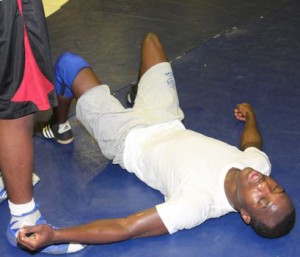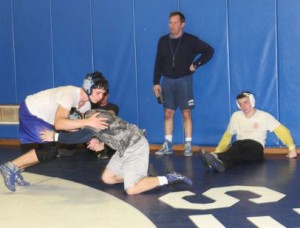Riverhead’s wrestling room is where hard work happens

Hot and smelly, the Riverhead High School wrestling room is not a pleasant place to spend a couple of hours — and that’s just for a visitor. To the wrestlers who toil in this sweatbox, it is the site of their daily struggle to keep up with the competition.
The wrestling room is not built for comfort. Its purpose is to prepare Riverhead’s wrestlers for the rigors of a sport in which a direct link can be drawn between work ethic and success. The training sessions that are held between these walls can best be described as grueling. The Riverhead Blue Waves have a reputation for tough practices in which wrestlers are continually pushed to the limit. Some have even compared it to military training.
“That’s what it is,” Riverhead senior Christian Krumbiegel said. “It’s boot camp, getting ready for war.”
As much as some wrestlers may hate it, they also recognize that the work done in the wrestling room is vital to their fortunes. One could apply all the usual clichés: no pain, no gain; if it doesn’t kill you it will make you stronger; there are no shortcuts to success. They are all apropos.
“If you want to get better, you have to go hard,” Riverhead senior Pat Thomas said. “It’s everything. It’s absolutely everything. If you’re not going hard here, it just shows on the mat. Every little thing that you don’t do here is going to be exacerbated 30 times [in a] match.”
That point is pounded into them during practices as Riverhead Coach Wade “Rocky” Davey tells them they must handle this training as if it was a match and exhorts his wrestlers not to get tired. “Getting tired is kind of like giving up,” Davey said. “You got to be stronger than getting tired. You got to have a will to work harder than what your mind is telling you.”
Of course, the truth is fatigue is a reality, and wrestlers must find the strength to overcome it. Following a typical practice last Thursday, Krumbiegel and Thomas, who are training partners, were so tired that they asked to be allowed to sit on the mat, with their backs against a wall, while being interviewed.
“You’re always tired, but you got to fight through it,” said Ryan Gevinski, a freshman in his first varsity season who noted that he was “shocked” when he learned how difficult Riverhead’s practices were.
Krumbiegel said: “Your body gets used to it, but you can’t really get used to it. Every day you’re just tired. You just go in, you just got to do what you got to do, and you just push through it mentally. As you keep doing it and doing it, you start building self-discipline. Your mind tells you, ‘No,’ but you keep telling yourself that you got to go hard.”

As tough as wrestling is physically, it also requires a certain mentality. The Blue Waves are doing more than building their strength and honing their wrestling skills; they are also building an attitude.
“If you don’t develop good work ethics, which you should by working hard in this room, then your attitude doesn’t develop, either, and attitude is a big part of wrestling,” Davey said. “If you don’t have the attitude to be a champion, you’re not going to be one, and I don’t know any guy out there who’s winning easily. You got to work hard to win.”
Davey, who coached at Suffolk County Community College and Shoreham-Wading River High School before coming to Riverhead, said the format of his practices has remained the same over the years. What has apparently changed, however, is the difficulty of the practices. “Has it gotten easier over the years? Absolutely,” Davey said. “I think that’s the change of society. I mean, our kids — I hate to say this — are softer now than they were 20 years ago. They absolutely are.”
The wrestling room is where championships are won. Riverhead was a double winner last season, taking first place in Suffolk County League IV as well as in the league tournament.
To the Blue Waves, the hard work they do is the price to be paid for winning. Some might also see the demanding practices as a confidence-builder.
“The first year, your freshman year, it’s like hard and you’re like, ‘Oh my God, I can’t do this,’ ” Thomas said. “But if you keep yourself in the game mentally, you can do anything you want. You got to believe in yourself. That’s basically what wrestling is all about.”
If the Blue Waves need added motivation, all they have to do is look up at one of the walls bearing the names of the team’s county and league champions. Eighty-eight Blue Waves have won league championships (seven did so three times) and 24 have won county titles.
Davey said the training mind-set that wrestlers develop is like a disease in the sense that it becomes obsessive. For example, the training day for the Blue Waves didn’t end with the conclusion of last Thursday’s practice. Many were expected to run or work out again later that night.
Fear of opponents gaining an edge by training harder has created a conditioning arms race of sorts. That explains the commitment of wrestlers like Thomas, who said, “This is my life right here.”
That fear of losing is a motivator.
“Winning is what motivates you,” Krumbiegel said. “When you win on the mat, it’s like no other feeling. You want to keep experiencing that over and over.”
As for training, he said, “I love it, but I hate it.”







